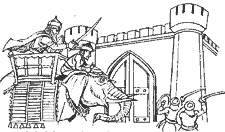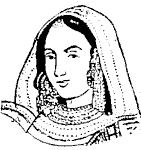|
 Maulvi Ahmadulla, considered the brain behind the uprising in Awadh, hailed from Arcot near Chennai. In January 1857 the Maulvi exhorted the people of his native place to rise against the British but his appeal evoked little or no response. Accompanied by a small band of devoted followers he left the south and headed north where he found the people more receptive to his ideas.
Maulvi Ahmadulla, considered the brain behind the uprising in Awadh, hailed from Arcot near Chennai. In January 1857 the Maulvi exhorted the people of his native place to rise against the British but his appeal evoked little or no response. Accompanied by a small band of devoted followers he left the south and headed north where he found the people more receptive to his ideas.
Alarmed by the activities of the Maulvi, the authorities in Faizabad put him behind bars. When the revolt broke out he was in the Faizabad jail.
He was freed by the sepoys along with other prisoners and he went to Lucknow where he played a major role in the siege of the Residency. When Lucknow fell he escaped to fight at other fronts, notably in Rohilkhand.
On 5th June 1859, the Maulvi arrived in Powain, a small fort on the Oudh-Rohilkhand border. When the Raja of Powain closed the gates to prevent him from entering, he got on an elephant and charged at the gate. He was shot dead by the garrison.
Paying rich tributes to the Maulvi, Malleson writes:
"If a patriot is a man who plots and fights for the independence, wrongfully destroyed, of his native country, then most certainly Maulvi was a true patriot .... he had fought manfully, honourably and stubbornly in the field against the strangers who had seized his country, and his memory is entitled to the respect of the brave and the true-hearted of all nations."
|
Begum Hazrat Mahal
 The British treated the rebels from Awadh which now forms the central U. P. area with greater consideration than the rebels of other parts. Awadh had been recently annexed and the revolt in Awadh was seen as a protest against this annexation.
Begum Hazrat Mahal who declared her son the ruler of Awadh, gave the British a tough fight.
After the fall of Lucknow the capital, she fled to Nepal. The British were keen that she return to India and promised her a suitable pension and assured her of all honours befitting her rank if she did so. But the Begum declined to renounce the rights of her son by accepting pension.
The British treated the rebels from Awadh which now forms the central U. P. area with greater consideration than the rebels of other parts. Awadh had been recently annexed and the revolt in Awadh was seen as a protest against this annexation.
Begum Hazrat Mahal who declared her son the ruler of Awadh, gave the British a tough fight.
After the fall of Lucknow the capital, she fled to Nepal. The British were keen that she return to India and promised her a suitable pension and assured her of all honours befitting her rank if she did so. But the Begum declined to renounce the rights of her son by accepting pension.
|
|
|
Woman in Green
 Rani Laxmi Bai was not the only woman who fought the British in 1857. There were several others.
Col. Keith Young, in one of his letters to his wife written from Delhi in 1857 writes: "Did I tell you that they took a woman prisoner the other day, who was leading a charge of Cavalry and who killed two of our men with her own hand?"
H.H. Greathead in his letter written during the siege of Delhi, gives more information about this unknown woman warrior: "A Joan of Arc was made prisoner yesterday; she is said to have shot one of our men, and to have fought desperately. She is a 'Jehadin', a religious fanatic, and sports a green turban and was probably thought to be inspired."
Forbes-Mitchell in his "Reminiscences of the Great Mutiny of 1857-59," while describing the capture of Lucknow mentions 'a woman who, perched on a large peepul tree in the court of Sikandar Bagh, shot a number of British soldiers, and was shot in her turn.'
Many women fought in the last desperate battle to prevent the capture of Lucknow. Lieut.Col.Gordon-Alexander, an eyewitness writes: "They fought like wildcats, and it was not till after they were killed that their sex was even suspected."
Rani Laxmi Bai was not the only woman who fought the British in 1857. There were several others.
Col. Keith Young, in one of his letters to his wife written from Delhi in 1857 writes: "Did I tell you that they took a woman prisoner the other day, who was leading a charge of Cavalry and who killed two of our men with her own hand?"
H.H. Greathead in his letter written during the siege of Delhi, gives more information about this unknown woman warrior: "A Joan of Arc was made prisoner yesterday; she is said to have shot one of our men, and to have fought desperately. She is a 'Jehadin', a religious fanatic, and sports a green turban and was probably thought to be inspired."
Forbes-Mitchell in his "Reminiscences of the Great Mutiny of 1857-59," while describing the capture of Lucknow mentions 'a woman who, perched on a large peepul tree in the court of Sikandar Bagh, shot a number of British soldiers, and was shot in her turn.'
Many women fought in the last desperate battle to prevent the capture of Lucknow. Lieut.Col.Gordon-Alexander, an eyewitness writes: "They fought like wildcats, and it was not till after they were killed that their sex was even suspected."
|
|
| 
